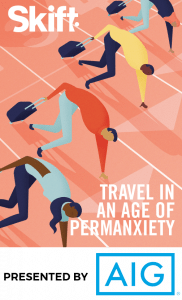Skift Take
Professionalizing the homesharing experience is helping to alleviate travelers’ concerns and anxieties about staying in a stranger’s house. But there's always room for improvement.
Skift launched the latest edition of our magazine at the Skift Global Forum in September. This article is an excerpt from our look into the current state of the traveler and consumer mindset through the lens of the pervasive state of anxiety felt worldwide.
Download the full version of Skift’s Travel in an Age of Permanxiety magazine here.
Airbnb, HomeAway, onefinestay, and their peers all have the comforts of home when it comes to the accommodations they offer on their sites, and with that, sometimes the stress of dealing with hosts and homeowners without any formal hospitality training.
But these companies are also learning that as alternative accommodations become less of an alternative and more mainstream, they need to professionalize the experience a bit more to address travelers’ very valid concerns.
Given the massive number of bookings these platforms facilitate on a daily basis, there are relatively few instances where things have gone terribly wrong during a home stay. But when they do, those stories often go viral, and they only add to the valid concerns any traveler might have about staying in a stranger’s home versus a hotel.
Not only that, but recent incidents where hosts and guests alike have been subject to bias or discrimination on peer-to-peer platforms like Airbnb have only added to the anxiety travelers feel. For some travelers, it’s not even a matter of whether everything will be all right during the actual stay, but whether they’ll even have a place to stay.
To that end, many alternative accommodations providers have attempted in varying degrees to assuage travelers’ concerns by implementing new features that allow guests to instantly book a listing, easily order groceries, or turn to the support of a trusted on-site concierge.
Airbnb and HomeAway
On one end, there are platforms like Airbnb and HomeAway where, in some instances, travelers do have to interact with the hosts or homeowners directly. And on the other end, there are platforms like Oasis, onefinestay, and Paris Perfect that act more like professional rental management companies and offer additional services to guests during their stay.
Airbnb head of global host and community operations and general manager of vacation rentals Jonathan Lesser, an Airbnb host himself, said that the key to addressing travelers’ concerns is giving “hosts the kind of information they need to provide a great guest experience” and “setting expectations.”
He noted that Airbnb invests in online education, community meetups, and specific platform features that make it easier for hosts to know how to host, as well as communicate appropriately with their guests. A hospitality standards page encompasses “a checklist of the things you should provide for your guests.”
“Our efforts to make sure hosts think about expectations don’t mean that we create a cookie-cutter experience that is the same every time. It just means that a host has done the kinds of things that any great host, whether it’s on a platform like Airbnb or just me hosting you in my house, would do to make sure their guest is well taken care of.”
And when it comes to Instant Book, Lesser noted it now comprises “over half of our bookings and nearly half of our listings.” For reference, 1.9 million of Airbnb’s total 4 million listings are Instant Book, and since the company’s founding in 2008, it has had more than 200 million guest arrivals. Instant Book allows guests to book a listing on Airbnb instantly, without having to wait for host approval, thereby minimizing any bias or discrimination on the part of a host.
Lesser said, “Guests like Instant Book because they have an easy and magical booking experience and, frankly, hosts like it because it eliminates the back and forth and makes it easier for their listing to get booked. For me, this is just another way that we extend the hospitality into the booking process and make it easier for both sides. So, for me, it adds to the specialness of Airbnb.”
Likewise, at HomeAway, chief product officer Tina Weyand says the company is also working hard to encourage more of its homeowners to adopt instant booking, but without imposing it on its hosts.
“Travelers expect online booking,” she said. “There is a large set of travelers who expect instant booking. We know it’s not right for every owner, so we have the option for them to have it and not to have it. We want to provide the right tools and education for owners, but give them the control to manage their property most effectively, but also give ease of use and meet traveler expectations.”
Weyand said more than 90 percent of HomeAway’s owners accept online bookings (although that doesn’t mean they are necessarily instantly bookable), and the remaining 10 percent “are onboarding right now.” She added that HomeAway has more than one million instantly bookable listings, and the conversion rate for those listings is higher than those that are not instantly bookable.
Both Lesser and Weyand also noted that their respective companies offer 24/7 customer service to guests.
Weyand said HomeAway is also using its research and user labs in Asia, Europe, and the U.S. to better understand how customers are using its product, and to “make sure there are no surprises, by reducing the friction and anxiety some travelers might have, and to make it a more consistent and reliable experience.”
Oasis, onefinestay, and Paris Perfect
Last November, Airbnb CEO Brian Chesky hinted at the possibility of integrating on-demand services like grocery delivery into the Airbnb app, but these kinds of services are already being offered by some of the company’s competitors such as Oasis, onefinestay, and Paris Perfect.
Unlike Airbnb or HomeAway, these platforms operate on models that borrow more heavily from the traditional hotel experience so that, for one thing, hosts don’t ever have to actually interact with the guests who stay in their homes. The companies do all the work instead, and provide additional services to guests to make them feel more at home. They also carefully vet and curate the properties that they advertise so they know exactly what that listing is like.
“The market was naturally going to focus on the kind of higher volume, mass-market solution first, which is why VRBO, HomeAway, and Airbnb have scaled the way they did,” said Parker Stanberry, CEO of Oasis. “But now we’re at a point where what we saw and some other folks saw is that for certain travelers, especially corporate travelers or solo female travelers, there’s a demand for higher levels of convenience, service, and safety, which is why more companies like Oasis are popping up.”
At Oasis, guests have ongoing concierge support and the ability to add services to their stay, such as a stocked fridge, breakfast, a mega bar, extra cleaning, etc. They also benefit from what Oasis calls “perks” — member club access in 14 of Oasis’ 22 cities, as well as spa or gym partnerships where available.
At onefinestay, CEO Javier Cedillo Espin noted that all guests at onefinestay properties receive an iPhone, pre-loaded with local data, and they are greeted personally upon arrival. “It’s a branded experience that is consistent across each home in every city wherein we operate,” but still one, he noted, that’s “authentic and local.” He added, “We consider onefinestay to be an operator in the hospitality world, owning every point of the process and experiences, and as such, we’re in a unique position to move nimbly as the market continues to grow and mature.”
At Paris Perfect, CEO Madelyn Byrne said that because all of the homes advertised on her site are owners’ second homes, her company does all it can to make sure it’s a branded experience, consistent with what a hotel might offer, too. “We’re not just a listing agency. We’re an agency that manages the apartments 100 percent. We now have our own sheets — 400-thread-count percale sheets with our logo on them and our own laundries to handle it,” she said. “There’s consistency.”
However, she added, “It’s not professionalized in that it’s like a Marriott where every single room has a lamp hanging in the same location in the window, or exactly the same furniture. It’s not that at all, because every apartment is different and every guest experience is going to be different.”
When it comes to instant bookings, these platforms apply different approaches.
Paris Perfect, Byrne said, is the agency that approves all bookings that come through the site, and she said “we don’t discriminate; that goes without saying.”
Cedillo Espin, when asked if onefinestay had instantly bookable listings, said, “Guests can book directly from our website, but we find ultimately our customer base is looking for a curated, tailored experience, and conversely, our homeowners want each guest to be vetted so most choose to work through our trusted travel advisors. It’s these two points that make our experience unique and successful.” So, it’s not exactly clear whether onefinestay does have instantly bookable listings.
Stanberry, however, said approximately 35 percent of Oasis’ listings are instantly bookable and that he’s trying to push toward 50 percent in the near term. Those listings that aren’t instantly bookable, he said, have certain parameters set by the owners, such as the maximum number of guests, the pet policy, smoking or non-smoking, etc. Oasis has guests fill out those forms and then checks their information against the parameters set by the homeowner.
“There are people who want the full-on hotel, full stop, and people who want a true, authentic home-sharing experience,” Stanberry said. “We’ve really tried to nail the middle point where you are getting what me and my peers think are what’s great about a home stay. The goal is to make people not anxious, period. With us, you don’t have to make that leap.”
If Oasis, onefinestay, and Paris Perfect are any indication, as the sharing economy becomes more mature and more mainstream, we can no doubt expect more companies to be offering a more professionalized home stay experience.
Dwell Newsletter
Get breaking news, analysis and data from the week’s most important stories about short-term rentals, vacation rentals, housing, and real estate.
Have a confidential tip for Skift? Get in touch
Tags: airbnb, alternative accommodations, homeaway, hospitality, oasis collections, onefinestay, permanxiety, sgf2017, skift global forum
Photo credit: More alternative accommodations platforms are looking for solutions to alleviate travelers' fears and anxieties related to staying in another person's home. Patricia Mafra / Skift

